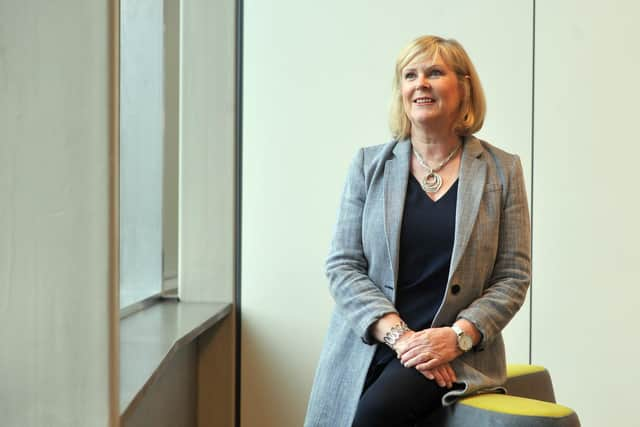Screen Yorkshire's outgoing Sally Joynson on 16 years at the film and taking a punt on Peaky Blinders
“I’m going to do nothing for a while,” says Sally Joynson, who has just stepped down as chief executive of Screen Yorkshire.
Quite right too. Given her prolific role in making the region a hot spot for film and television production over two decades, she is overdue a well-earned break.
Advertisement
Hide AdAdvertisement
Hide AdJoynson, 65, left the Leeds-based organisation at the end of December after 20 years, spending 16 as its boss.


During her tenure, the screen industries in Yorkshire and the Humber have grown to a point where it’s estimated they support more than 12,000 jobs, directly and indirectly, with a turnover beyond £1.1bn.
It will be a wrench to go, but the time is right, she says.
“I was the second member of staff into this new company called Screen Yorkshire. And then I took over formally as chief exec in 2006. Sixteen years is a very long time. How am I feeling about it (leaving)? Not surprisingly, mixed emotions. I’m very excited to be going into a new period of life. But obviously very sad to be leaving my colleagues at Screen Yorkshire – I have a fantastic team and I will be very sorry to leave them behind.
Advertisement
Hide AdAdvertisement
Hide Ad“But I always said when I got to a certain age that I would step back and just have a little bit more time to do things that I want to do. As I have said before, in the twinkle of an eye, it’s all gone. That time has arrived and it’s time to step down.”


There is plenty for her to look back on. Screen Yorkshire is responsible, in part, for some of the biggest and best British television shows of the past decade hitting our screens.
Either through investment or production assistance, the organisation has played a role in creating global phenomena such as Peaky Blinders and Netflix’s Bridgerton – Castle Howard consequently being streamed to an audience of 82 million viewers – as well as the remake of All Creatures Great and Small, a show perfectly timed for a country in need of wholesome cheer amid pandemic gloom.
It was not all plain sailing, though. Before the success of recent years, Joynson had to rebuild an organisation that had been reduced to a skeletal operation. Screen Yorkshire, during its first 10 years, was part of a publicly-funded network of regional screen agencies supported by the UK Film Council. Among a broad range of activities, it part-financed film festivals, archives and community programmes such as rural cinemas, as well as taking part in education schemes.
Advertisement
Hide AdAdvertisement
Hide AdAfter the Government changed hands in 2010, the UK Film Council was abolished and the nine regional screen agencies were broadly integrated into just one, Creative England. Screen Yorkshire, which was founded in 2002, had to cut its staff numbers from around 28 to about four.
Joynson says: “We lost everything. We lost all the screen agencies, we lost our remit, we lost all our contracts, I lost 80 per cent of my staff. Like any small business, that is a huge thing to go through.”
However, the situation “forced Screen Yorkshire to rethink its own future,” says Joynson, who did want to steer it in an independent direction, and it became more commercially-focused. It benefited from £14m of support from the European Regional Development Fund – an amount which has since leveraged £224m of production business, says Screen Yorkshire, while regional spend usually outstrips its own investment by 300-400 per cent to create major economic benefits - and enabling a “tremendous shift” in what it could do.
Its Yorkshire Content Fund, launched in 2012. “That was certainly a memorable moment which at the time didn’t feel like a very happy event. But in fact, it turned into really the best thing ever for Screen Yorkshire,” says Joynson.
Advertisement
Hide AdAdvertisement
Hide Ad“One of the most memorable things has to be our first investment through that new fund, which was into a new drama series for BBC Two. It was pitched to Screen Yorkshire’s new fund, had a slightly unusual title. We were never sure whether it would catch on or not. But that series was Peaky Blinders. And of course that has gone on to be a huge global success.”
The series has been filmed in Yorkshire at various points during its five seasons – the sixth and final outing airs this year – bringing stars such as Oscar-winner Adrien Brody to locations such as Bradford.
Since then, the Yorkshire Content Fund has been used to part-finance more than 50 projects, including Official Secrets, Ackley Bridge, Ghost Stories and National Treasure.
What has been Joynson’s favourite Screen Yorkshire-associated film or TV show to watch? “I really couldn’t pick that one because it’s such a diverse slate. I mean, how do you compare something like Dad’s Army with Official Secrets or Peaky Blinders?
Advertisement
Hide AdAdvertisement
Hide Ad“I’ve been a huge fan of Peaky Blinders since we first read that first script when it came into the office. I love the series, it is absolutely magnificent. But then you look at something like All Creatures Great and Small, which could not have hit our screens at a better time, in terms of Covid and lockdown. I loved The Damned United, our feature film on Brian Clough’s short-lived tenure at Leeds United. There’s been a lot to be very pleased about.”
Joynson, of York, was also part of the team that put together the successful bid for Channel 4 to open its new national headquarters in Leeds. With a potential sale of the publicly-owned, commercially-funded channel in the pipeline, some are concerned that indie production would take a hit.
She says that the number of submissions to the consultation on privatisation – around 60,000 – “demonstrates the strength of opinion against the privatisation of Channel 4.
“I think Screen Yorkshire’s take on this is that privatisation would not be a good outcome for regional broadcasting, for the independent sector that relies very heavily on Channel 4 for many of its commissions, and also for investment in the regions. So fingers crossed that the new Secretary of State (Nadine Dorries) doesn’t support privatisation.”
Advertisement
Hide AdAdvertisement
Hide AdDespite 2020 being a “dreadful year” of production shut-downs because of Covid-19, Screen Yorkshire is “busier than ever” as she hands over the CEO role to Caroline Cooper Charles, the company’s former head of creative.
“I’m leaving at a point where things are looking good,” she says.
Joynson expects there to be an expansion of regional commissions and highlights the importance of that economically – the recognition of which being a big change over the last 20 years.
She says: “I think people really do understand that now. They understand the number of jobs that it creates, the amount of inward investment it promotes, and also the fact that the productions that we work on and invest in with Screen Yorkshire are sold all over the world. So they are a great calling card for this region.”